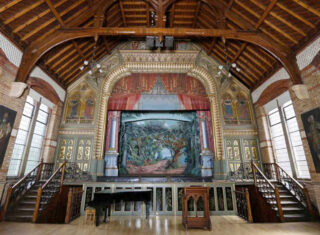Freeman, John George. Holiday Rambles: Scotland, 1876, South Wales, 1877. Manuscript travel journal, pp. 200 (both sides of 100 leaves), copiously filled with an attractive handwritten script in black ink, embellished with very fine, charming pen & ink illustrations including architectural & topographical views and homorous cartoons. Small quarto, contemporary crushed morocco lettered in gilt, all edges gilt, featuring 62 ink vignette illustrations, including two manuscript maps, plus decorated titles for the two sections, headings in blue ink, and floral dividers. The humorous style is reminiscent of Three Men in a Boat and The Diary of a Nobody, though it pre-dates both of these famous works. The author's dry wit is expertly delivered in his erudite prose. He describes travelling on steamers and trains, the difficulty of sleeping, the exploits of eccentric or drunken passengers, long excursions on foot, hotels, food, scenery, weather. The places visited include Gravesend; Edinburgh; Stirling; numerous towns & landmarks in the Scottish Highlands; Chepstow; Symonds Yat; Ross-on-Wye; Hereford; Hay-on-Wye; Builth Wells; Aberedw; Newbridge; Doldowlod; Ponterwyd; Aberystwyth; Newport. The work includes a loosely-inserted manuscript leaf, 'Please not to lend this book to children & keep it clean. John George Freeman, 134 Regent St, London. Should this book be lost the finder is requested to bring it to the above address when he will be rewarded.' Contents well-preserved, clean, bright, some pale spotting to endleaves, binding worn with loss to morocco spine. Extracts:
'Usually I manage to go to sleep almost immediately, but then our house at Regent St is a stationary one, and I did not seem to take kindly to the continued motion of the boat...to my surprise I found two ladies and four gentlemen had made themselves beds and intended to pass the night in the open air, the latter were lying on their backs and singing "Hold the Fort" with not a very charming effect.'
'On nearing our destination, a very stout individual (who must have weighed quite sixteen stone) accosted us, and desired to know "why we wore those white things on our heads?" On being told it was to protect them from the sun's rays he seemed to think it was a splendid idea, saying it was quite time he did something in that direction, as he had suffered very much from the late extreme heat (he was about 60 years of age, and walking about without any coat): he appealed to one of his countrymen as to the utility of the invention, but this gentleman was of a taciturn disposition and declined to pass an opinion on the subject, still if the reader should at any time happen to be passing near Buchlyvie and see a very obese individual wearing a puggaree, he will of course at once know how to account for so curious a sight.'
'5.30am. I was awakened by a tremendous noise, and soon became aware it was caused, not by the descent of the top of our bedstead, but by a neighbouring bell which was loudly pealing to warn all "early birds" that the "worms" had already began to take their morning walks, or in other words that it was time to get up.'
'In Princes Street are a number of shoe-blacks, two of whom we engaged to polish our boots, and were rather surprised at their demand of two pence per pair for their labour, on our saying the London charge was only half that amount, they retorted no Shoe-black Society existed here, so they fixed their own tariff.'
'Having seated ourselves in the train, after the usual delay, it started off with a tremendous jerk which caused most of the passengers to make motions as if they wished to visit the opposite end of the carriage...[one passenger] said that when the company had sufficient money they would use horses instead of the present engine, and so be able to proceed at a reasonable speed.'
'The man who was so intoxicated last night now made an attempt to perform his toilet, and to my astonishment endeavoured to shave, what with the motion of the vessel and the equally unsteady movements of his hand it is a puzzle to me how he accomplished this feat without cutting his face.'
'The intoxicated passenger once more appeared on deck and declared he had lost his watch, this was rather unpleasant for those who had slept near him, though of course no one could tell but that he had thrown it overboard during the night...he brought his holiday to a fitting termination by confessing he had not enough money to pay his bill.'
'The name of this drunkard deserves to be recorded...should the reader ever come in contact with Mr Trotter, hosier, of 20 Newgate Street he will do well to avoid his company.'
'After a very uncomfortable night's rest which was disturbed by a donkey, cock, and cat, - doubtless they were anticipating the enjoyments of the coming bank holiday - we rose.'
'A young lady was trying to sing songs to a pianoforte accompaniment, at first it was endurable but afterwards she attempted something much beyond her capability and was evidently "feeling" for the notes, I suppose my face indicated the agony I endured as the question was asked "Do you object to the music (?) Sir?" to this I replied it was rather difficult to write at the same time (which I was trying to do).'
The beautifully illustrated diaries of John George Freeman - who travelled across Britain during the 1870s with his brothers, Charles and Joseph - formed the basis for Three Men and a Bradshaw: An Original Victorian Travel Journal, edited by Ronnie Scott [Random House, 2015], which is described as, 'an enchanting description of a distant but nonetheless recognisable Britain which blends together the singularly English wit of Jerome K. Jerome and the Pooterish pathos of the Grossmith brothers' most famous comic creation.'
Realised Price: £
{CUST_LABEL_ARTIST_NAME}:
{CUST_FIELD_ARTIST_NAME}
{CUST_LABEL_SCULPTURE_DESCRIPTION}:
{CUST_FIELD_SCULPTURE_DESCRIPTION}
{CUST_LABEL_ARTIST_INTRODUCTION}:
{CUST_FIELD_ARTIST_INTRODUCTION}




